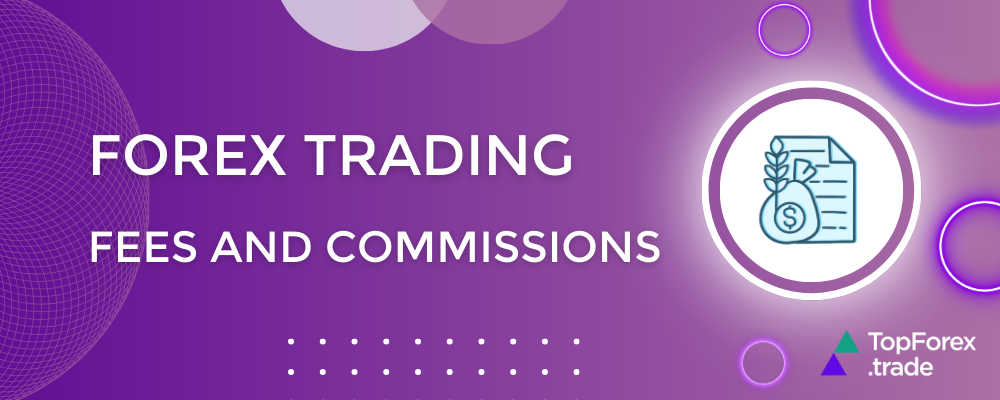Exploring Forex trading costs: discovering leading brokers with minimal commissions

Forex brokers‘ trading fees and commissions are pivotal factors in investors’ financial journeys, yet their intricacies often remain veiled. This article aims to demystify these aspects, offering a concise exploration of the different fee structures, evolving landscapes, and implicit costs investors encounter.
Understanding brokers’ fee structures is essential. They range from trade execution fees to account maintenance charges, often adopting varied pricing models such as flat fees or commission-free trading. Moreover, these structures evolve in response to market dynamics and regulatory shifts, necessitating vigilant monitoring.
Implicit costs, like bid-ask spreads and market impact, further complicate the fee landscape, influencing overall returns. Balancing low fees with the broader value proposition, including execution quality and customer support, is paramount for investors seeking optimal outcomes.
In essence, mastering brokers’ trading fees and commissions equips investors with the knowledge to navigate financial markets effectively, aligning their strategies with their objectives while optimizing costs.
FX brokers’ fees and commissions

Here’s a detailed breakdown of the fees and commissions commonly associated with FX brokers:
FX trading spreads
The spread is the primary revenue source for FX brokers. It represents the difference between the bid (selling) price and the ask (buying) price of a currency pair or other trading instruments. Brokers may offer either fixed spreads, which remain constant regardless of market conditions, or variable spreads that fluctuate in response to market liquidity and volatility. Traders should be mindful of the spread width, as tighter spreads can lead to lower trading costs, especially for frequent traders or those employing scalping strategies.
FX brokers commissions
In addition to the spread, some brokers charge a commission on trades, particularly for ECN (Electronic Communication Network) or STP (Straight Through Processing) accounts. This commission can be a fixed amount per trade or based on a percentage of the trade volume. While commission-based pricing may initially appear transparent, traders should factor in both spread and commission costs to accurately assess the total cost of trading with a broker.
FX trading swaps (roll-over fees)
FX trading involves borrowing one currency to buy another. If a position is held overnight (i.e., not closed by the end of the trading day), brokers may charge or credit swap rates to account for the interest rate differentials between the currencies being traded. Swap rates can either enhance or detract from a trader’s profitability, depending on the direction and size of the position held.
FX deposit and withdrawal fees
Brokers may impose fees on deposits and withdrawals, particularly for certain payment methods such as credit cards, bank transfers, or e-wallets. These fees can vary depending on the payment provider, currency, and the broker’s policies. Traders should consider the cost-effectiveness of different funding methods, factoring in both deposit and withdrawal fees, as well as processing times.
FX inactivity fees
To encourage active trading and account engagement, some brokers may charge inactivity fees if an account remains dormant for a specified period. These fees typically apply when there are no trading activities or account transactions over a certain timeframe. Traders should be aware of the broker’s inactivity fee policy and take proactive steps to avoid unnecessary charges, such as closing inactive accounts or executing periodic trades.
FX account maintenance fees
Certain brokers may levy account maintenance fees, either as a flat charge or as a percentage of the account balance, to cover the costs of providing trading services. These fees may be imposed on a monthly or annual basis and are independent of trading activity. Traders should carefully review the broker’s fee schedule to understand any account maintenance fees and assess their impact on overall trading costs.
FX currency conversion fees
If trading accounts are denominated in a currency different from the base currency of the trader, currency conversion fees may apply when depositing, withdrawing, or trading. These fees can arise from currency conversions performed by banks, payment processors, or the broker itself. Traders should consider the implications of currency conversion fees, especially when trading multiple currency pairs or operating accounts in different currencies.
FX platform fees
While many brokers offer trading platforms for free, some may charge fees for access to advanced trading platforms or premium features. These platform fees may be one-time charges, ongoing subscription fees, or additional costs for accessing proprietary trading tools, indicators, or charting capabilities. Traders should evaluate the functionality and cost of different trading platforms to determine the best fit for their trading needs and budget.
FX data fees
Access to real-time market data feeds may incur additional fees, particularly for professional traders or those requiring extensive data analysis tools. Brokers may pass on data fees charged by exchanges or data providers to clients who require access to live price quotes, news feeds, or historical data. Traders should consider the necessity and cost of real-time data subscriptions when evaluating brokers and trading platforms.
FX margin interest
If traders utilize leverage to amplify their trading positions, they may be subject to margin interest charges on the borrowed funds. Margin interest rates can vary depending on the broker and the amount of leverage used. While leverage can magnify potential profits, traders should be mindful of the cost implications of margin trading, including interest charges and the associated risks of margin calls and liquidation.
It’s essential for traders to carefully review and understand the fee structures of FX brokers before opening an account. Comparing fee schedules across different brokers can help traders find the most cost-effective options that align with their trading strategies and preferences. Additionally, being aware of potential hidden fees or charges ensures that traders can accurately assess the true cost of trading with a particular broker and avoid any surprises or unnecessary expenses.
Top Forex brokers with the lowest fees and commissions
This comprehensive list presents a curated selection of the Top Forex brokers distinguished for their commitment to providing traders with the lowest fees and commissions in the industry. Each broker has been meticulously evaluated based on factors such as spread width, commission rates, swap fees, deposit and withdrawal charges, and additional costs associated with trading. By offering transparent fee structures and prioritizing affordability, these brokers empower traders to maximize their profitability and optimize their trading strategies.
XTB transparent low fees
XTB has transparent fee conditions. For its Standard account type, there are no execution commissions, except for equity CFD and ETF trades, where slightly wider spreads apply. Account opening and maintenance for UK residents investing in stocks and ETFs are free, with no minimum deposit. XTB doesn’t charge fees for deposits, and withdrawals above 50 GBP are free. There’s no commission for trading stocks and ETFs up to a monthly turnover equivalent of 100,000 EUR, with a 0.2% commission thereafter, subject to a minimum of 10 GBP. For CFDs, there are no commissions, and the minimum order size is 0.01 lot, with a maximum leverage of 1:30 and a minimum spread of 0.3. EU residents have similar fee structures, except withdrawals are free only for amounts above 100 EUR. Non-EU/UK residents have the same fee conditions for stocks and ETFs, with a minimum investment value of 10 USD and a currency conversion fee of 0.5%. For CFDs, the fee structures remain the same, except for a maximum leverage of 1:500 and a minimum spread of 0.5.
eToro fees and commissions
eToro stands out for its transparent fee structures and user-friendly investment options. Account opening is free, and there are no management fees. However, there’s a $5 withdrawal fee, with a minimum withdrawal amount of $30, to cover some expenses associated with international money transfers. When depositing or withdrawing with a currency other than USD, a conversion fee applies, varying based on the payment method.
For inactive accounts, there’s a monthly fee of $10. Crypto trades incur a single 1% fee for buying or selling, with an additional 2% fee for transferring Crypto assets to the eToro Money crypto wallet.
CFD spreads vary, serving as the difference between buy and sell prices. Overnight fees may apply to CFD positions held overnight, relative to the position’s value. CopyTrader and Smart Portfolios come with no extra fees or hidden costs, with the same spreads and overnight fees as regular manual trades. Moreover, Smart Portfolios have no management fees or commissions, except those associated with the assets comprising each portfolio.
eToro Money provides fee-free deposits, instant withdrawals, and an eToro debit card (for UK Club members only), all without subscription or hidden costs. With its commitment to transparency and simplicity, eToro aims to offer users a hassle-free investing experience.
BlackBull fees and commissions
BlackBull Markets ensures transparent fee conditions, offering various account types suitable for traders of different experience levels. The ECN Standard account, perfect for beginners, features spreads from 0.8 pips without any commission. More experienced traders may prefer the ECN Prime account, with tighter spreads starting from 0.1 pips, but a commission of US$6.00 per lot traded applies. High-volume traders can opt for the ECN Institutional account, offering spreads from 0.0 pips with a commission of US$4.00 per lot traded.
Regarding deposits and withdrawals, BlackBull Markets doesn’t charge internal deposit fees. However, a $5 internal withdrawal fee per withdrawal per payment processor used is applicable. Notably, there are no inactivity fees, relieving traders from the pressure to trade frequently. Although dormant accounts may be archived after a period of inactivity, traders can reactivate them without losing their capital.
With a commitment to transparent fee structures, BlackBull Markets aims to provide accessible and tailored trading solutions for traders at all levels of experience.
XM Group fees and commissions
XM broker stands out for its client-oriented fee schedule, emphasizing transparency and cost-effectiveness in trading.
When trading with XM, clients can expect fees starting from $5 USD, spreads from as low as 0.6 pips, and commission-free trading, depending on the selected account type. This means traders can execute trades without worrying about additional fees, enhancing the overall affordability of trading.
One notable aspect of XM’s approach is the absence of hidden fees. Traders can engage in transactions without concern about undisclosed charges affecting their trades. This commitment to fee transparency contributes to a trustworthy and straightforward trading experience.
XM offers competitive tight spreads, recognizing that the trading landscape varies depending on the account type and asset class. The platform adjusts spreads accordingly, ensuring traders benefit from favorable pricing structures tailored to their specific trading preferences and goals.
Moreover, XM follows a zero-fee policy for deposits and withdrawals, further demonstrating its commitment to client satisfaction. Clients can fund their accounts and withdraw funds without incurring any charges, fostering a financially accessible and user-friendly environment.
Exness fees and commissions
Exness is committed to creating a trader-friendly environment, evident in its approach to trading fees and commissions. The platform stands out by offering fee-free management and withdrawal services, ensuring traders can navigate the market without worrying about additional costs. Moreover, traders have the flexibility to minimize trading expenses by selecting the most suitable account type tailored to their preferences. Exness also prioritizes transparency by illuminating swaps and overnight fees for a wide range of tradable instruments, including major currency pairs, stocks, cryptocurrencies, indices, and gold.
For Zero accounts, the trading commission starts at USD 0.2 for one side per lot, with rates subject to change based on the instrument traded. The Raw Spread account features rates of up to USD 3.5 per lot per one direction for most instruments, with some exceptions for indices and cryptocurrencies.
Exness further enhances accessibility by offering commission-free accounts like Standard, Standard Cent, and Pro accounts, where no trading commission is applied. This commitment to transparency, cost-effectiveness, and providing diverse account options contributes to a trader-friendly environment that empowers traders to succeed in their financial endeavors.
Related articles:
- How to start Forex trading and enter the exchange: 10 steps to your first deal with an online broker
FX brokers fees and commissions - FAQ